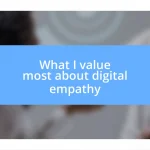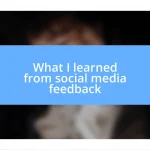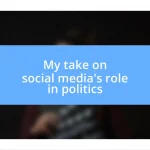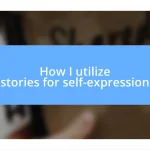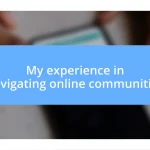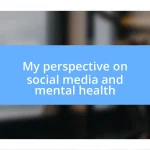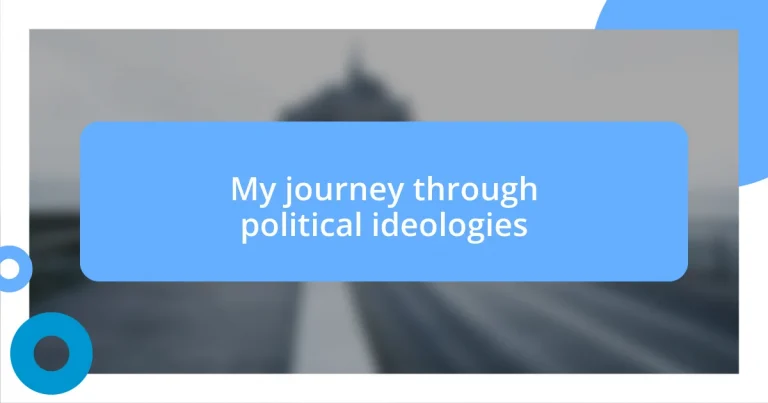Key takeaways:
- Engaging in conversations and experiences helps individuals reflect on and shape their political ideologies, revealing the personal narratives behind beliefs.
- Historical context significantly influences contemporary political ideologies, emphasizing the importance of understanding local histories and movements.
- Applying political ideology in daily life impacts personal and collective actions, driving individuals to make choices that reflect their values and societal goals.
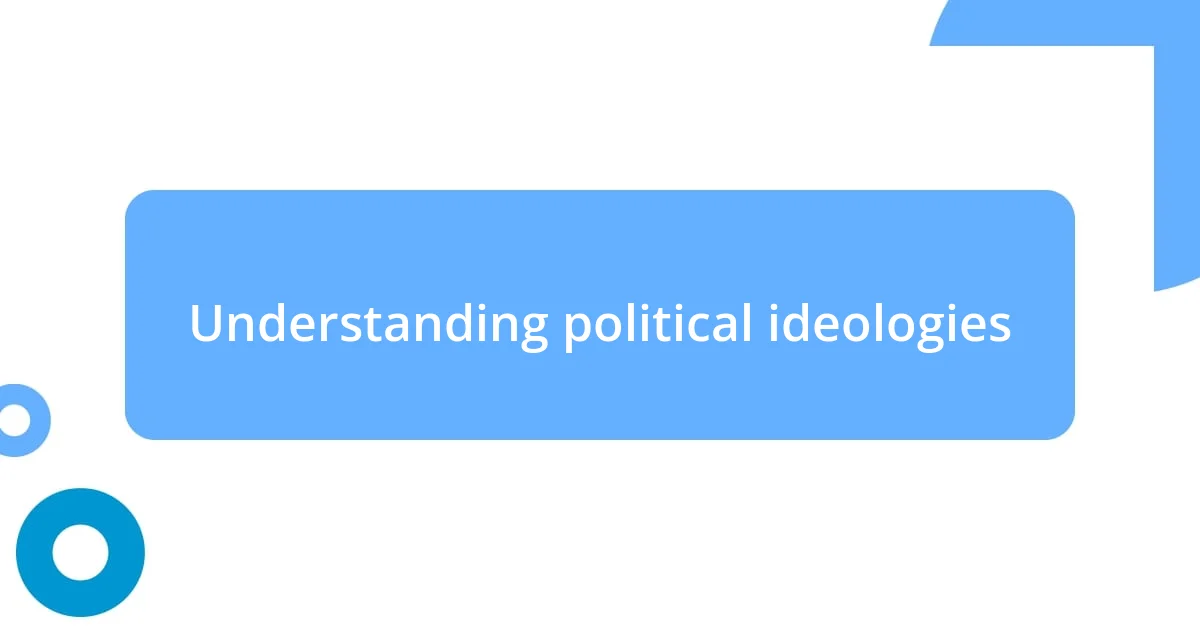
Understanding political ideologies
Political ideologies can feel vast and overwhelming, but at their core, they serve as a lens through which we understand the world. I remember grappling with the complexities of socialism versus capitalism during college debates. Seeing passionate classmates argue their points made me question my values: What do I truly believe in when it comes to equity and individual freedom?
As I dived deeper, I realized that each ideology isn’t just a collection of beliefs; it’s intertwined with culture, history, and personal experiences. For instance, my understanding of conservatism expanded when I spoke with a family member whose upbringing shaped their perspective on tradition and stability. Have you ever had a conversation that completely shifted your viewpoint? I certainly have, and it’s these exchanges that highlight how political ideologies are often rooted in real-life narratives.
Moreover, recognizing the emotional weight behind these ideologies has been eye-opening. I once attended a local rally, and witnessing the collective energy and passion of the attendees helped clarify why people are so committed to their beliefs. It got me thinking—how do we navigate our convictions when they seem to clash with those around us? Understanding that emotions play a significant role in political beliefs can lead to deeper empathy and more productive discussions.
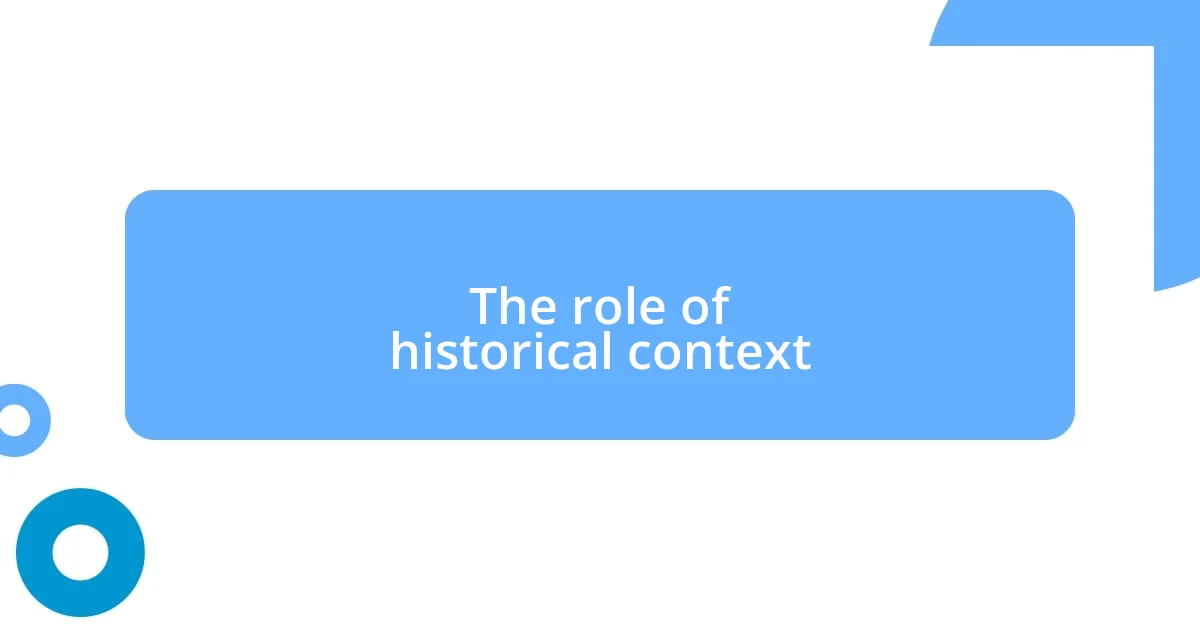
The role of historical context
The landscape of political ideologies is deeply shaped by historical context. I can vividly recall attending a history lecture about the Industrial Revolution and its profound impact on social class structures. Understanding how this era influenced the rise of socialism made me reflect on how past injustices can mold present ideologies. This connection to history can often reveal why certain beliefs become predominant or are resisted in different societies.
Interestingly, my exploration of political ideologies aligned with my readings on civil rights movements. Delving into the histories behind these movements helped me see how figures like Martin Luther King Jr. weren’t just reacting to their times but were also standing on the shoulders of those before them. It was during this period of reflection that I began to appreciate the weight of historical struggles in shaping today’s political discourse. Have you ever sensed the ripples of history in the present-day political landscape?
To delve a bit deeper, it’s fascinating to observe how different regions interpret similar ideologies based on their unique histories. While a concept like democracy may ignite passionate debates in one country, in another, it could symbolize a struggle for freedom against an oppressive past. This observation makes me realize how vital it is to consider the local context, as it can offer insights that are otherwise missed when we look at ideologies in a vacuum.
| Historical Context | Impact on Political Ideologies |
|---|---|
| Industrial Revolution | Rise of socialism due to class struggle |
| Civil Rights Movement | Influence of historical figures on contemporary beliefs |
| Global Perspectives | Variations in ideology interpretation based on local history |
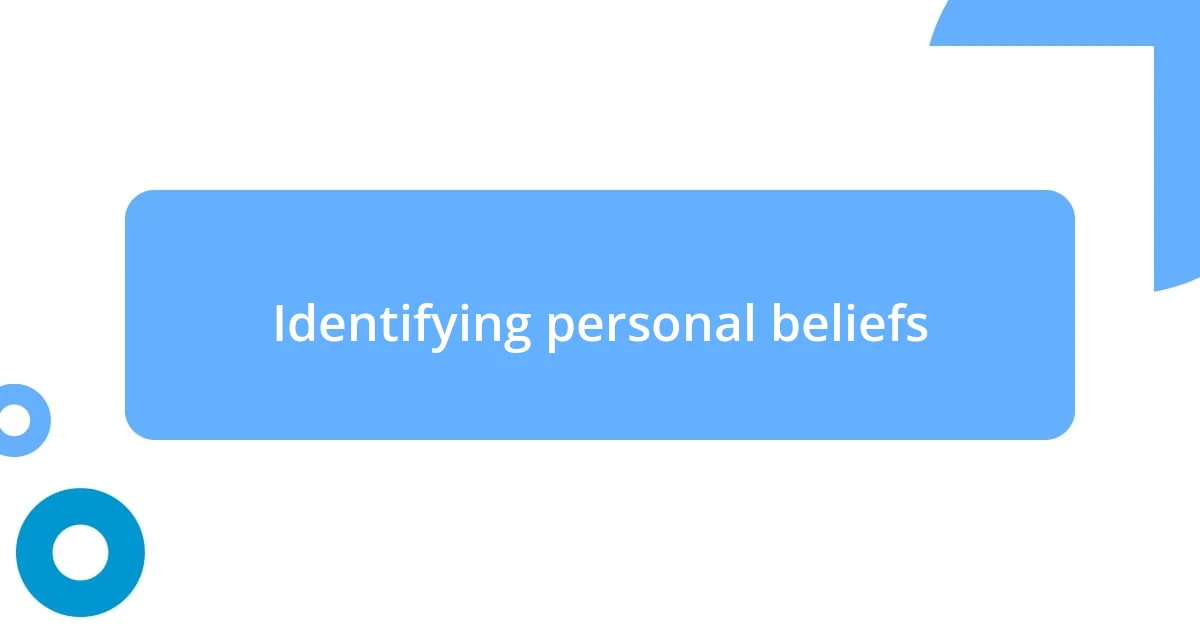
Identifying personal beliefs
Identifying personal beliefs can sometimes feel like peeling back layers of an onion. Initially, I often found myself echoing the beliefs of my family or friends, not fully realizing where my views ended and theirs began. I recall a specific moment during a group discussion in a philosophy class when I was challenged to articulate my stance on environmental policies. It wasn’t until I felt the urgency of climate change personally that I began to dissect my beliefs, making sure they related back to my values rather than to those around me.
To more clearly identify what I believe, I’ve found it helpful to consider key areas of reflection:
- Core Values: What principles resonate most with me (e.g., justice, freedom, equality)?
- Life Experiences: Which significant events have shaped my views?
- Influences: Are there specific thinkers or leaders I connect with?
- Emotional Responses: How do certain issues make me feel?
- Goals for Society: What type of world do I envision and hope to contribute to?
By engaging with these aspects, I’ve come to understand that my beliefs are a mosaic of personal experiences, values, and aspirations, empowering me to confidently navigate my journey through political ideologies.
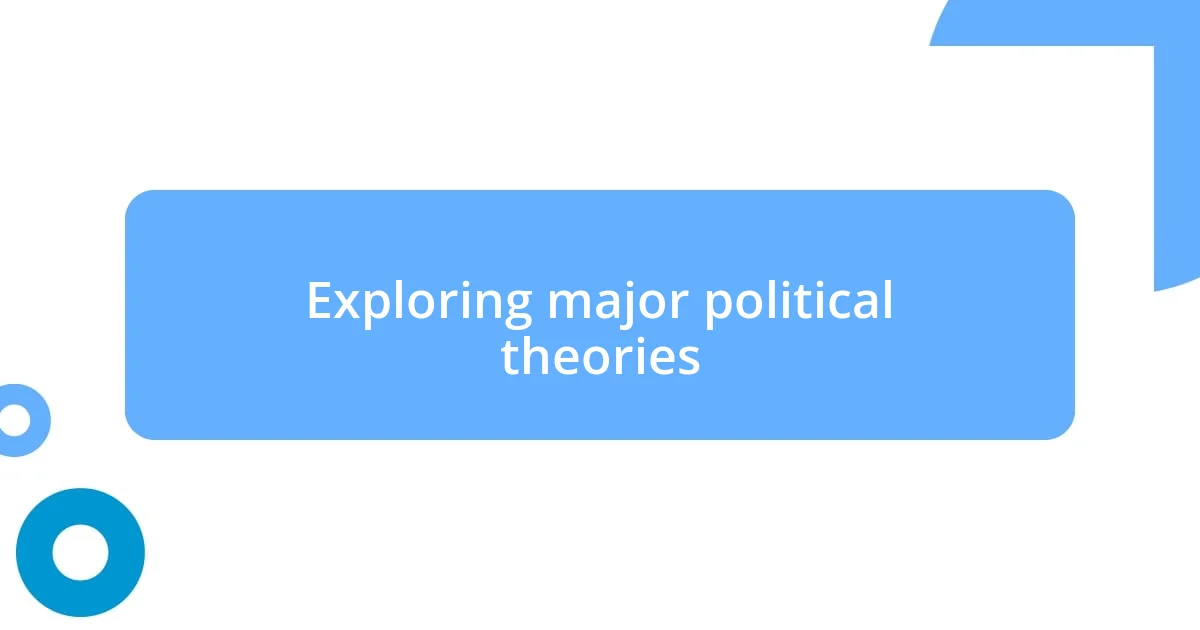
Exploring major political theories
Political theories serve as the backbone of our understanding of governance and societal organization. I remember my first encounter with liberalism, where the idea of individual rights resonated deeply with me. It sparked an internal debate about how freedom relates to responsibility—one of those moments when I paused and thought, “To what extent should I prioritize my freedoms over the collective good?”
Examining theories like conservatism and socialism revealed the complexities of societal balance. A class project on modern political movements led me to explore how these ideologies manifest differently around the world. For instance, the way socialism is interpreted in Scandinavia versus in some Latin American countries was enlightening. It made me question, how do local values and history shape the application of these theories?
Then there are theories like anarchism, which often seem daunting at first glance. I recall discussing it with friends who were largely skeptical, thinking of chaos and disorder. But delving deeper, I realized that the heart of anarchism lies in the belief in voluntary cooperation and self-governance. That made me reflect: could there be a way to challenge authority while fostering community trust and engagement? These explorations have paved my journey through political ideologies and encourage me to keep questioning and learning.
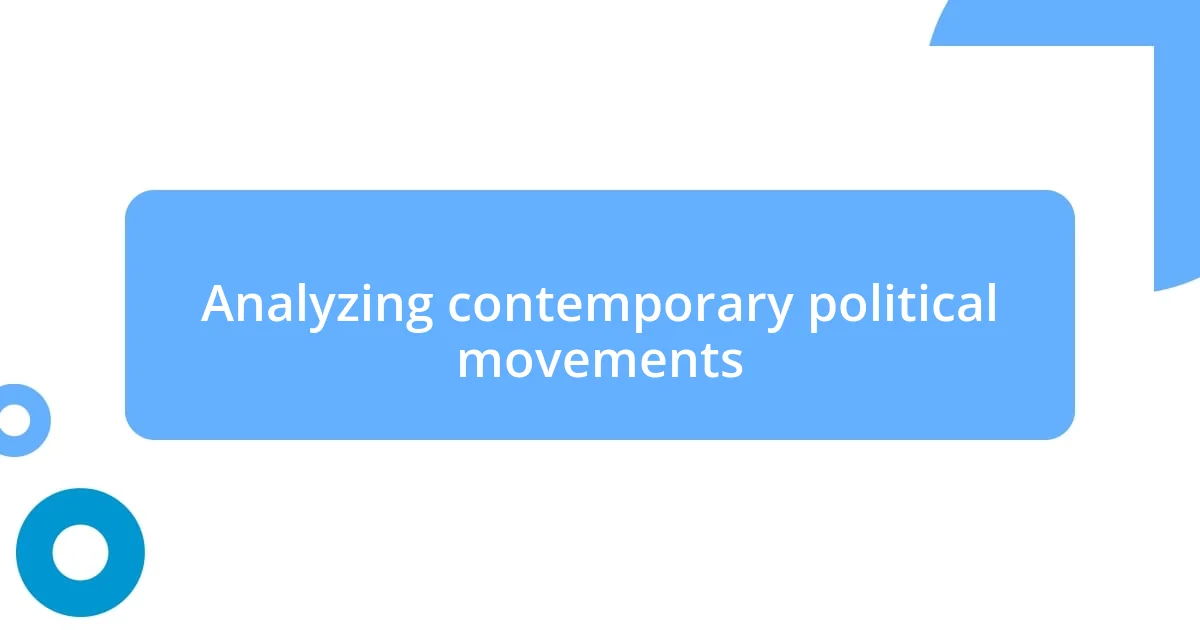
Analyzing contemporary political movements
Political movements today often mirror the fractures in our societies—issues like environmental justice and social equity have become rallying cries for many across the globe. I remember attending a protest that centered around climate change; the energy in the crowd was palpable. It made me think: how can collective voices shape policy when they represent an array of beliefs and interests? This blend of passion and discontent showcases how movements are often born from frustration, invoking a powerful desire for change.
Another observation I’ve made is how social media plays an unprecedented role in mobilizing contemporary movements. It’s fascinating to see how platforms can amplify a single tweet to a global audience. I recall scrolling through my feed during a significant rally; I was moved as I saw firsthand people sharing stories and experiences that connected them to the cause. This instantaneous communication raises the question: does this spontaneous activism translate into long-term commitment, or is it merely a momentary surge of outrage?
Ultimately, I see contemporary political movements as a tapestry woven from diverse threads of activism, protest, and discourse. Each thread represents different voices and perspectives, yet they often struggle to find common ground. I’ve found myself pondering: what happens when these movements collide? Can factions unite under a singular goal, or does fragmentation defeat their purpose? Reflecting on these dynamics not only enriches my understanding but also highlights the continuous evolution of political ideologies as they adapt to the needs of society.
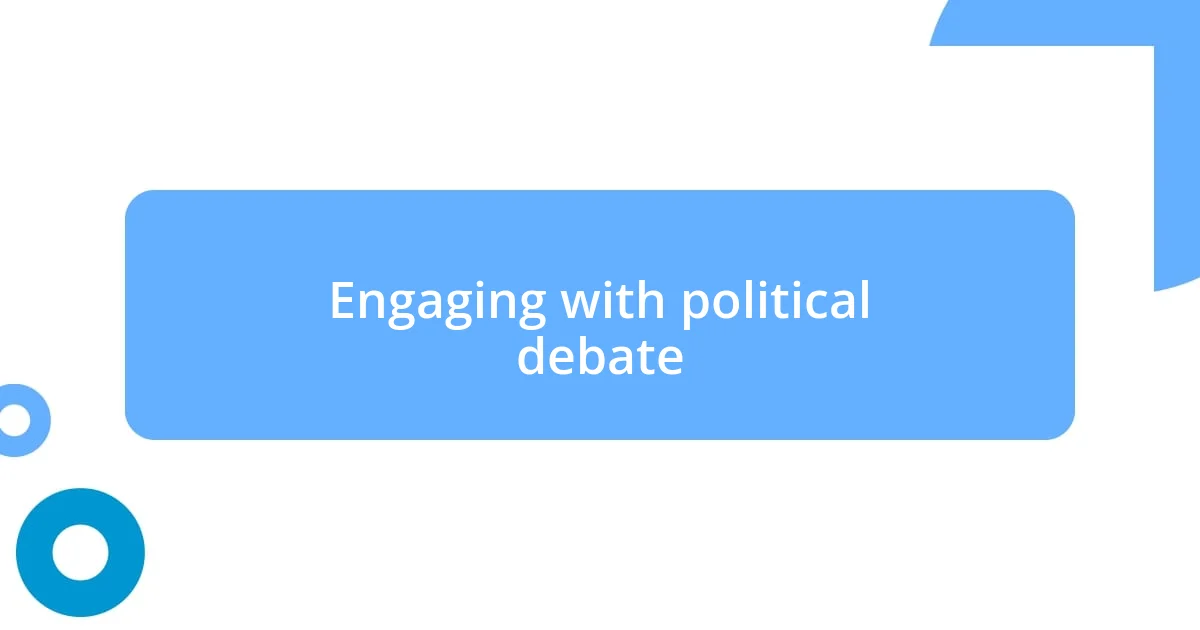
Engaging with political debate
Engaging with political debates can feel like stepping into a vibrant marketplace of ideas. I remember a heated discussion at a family gathering where everyone had different opinions on healthcare. It was eye-opening to witness how personal experiences shaped our stances. Have you ever found yourself on a side of the debate that surprised you? I realized then that our views often stem from deeply personal journeys, showing just how crucial it is to listen actively and empathetically.
Sometimes, debates can feel overwhelmingly chaotic, especially when emotions run high. I recall an online debate that spiraled into insults rather than productive dialogue. It left me wondering: how can we maintain respect amidst disagreement? My takeaway was that engaging with political discourse is not just about voicing opinions but also about building bridges across various viewpoints. Creating an atmosphere where civil discourse thrives is a challenge we must tackle together.
As I navigated through these discussions, I found that asking questions became my greatest tool. Instead of dismissing opposing views, I began to probe deeper. I would ask, “What led you to that conclusion?” Often, this opened up a genuine exchange of perspectives. Have you tried this in your conversations? It not only enriches the dialogue but also fosters mutual respect—even when views sharply contrast. An engaging political debate is not just about winning; it’s about understanding, learning, and growing collectively.
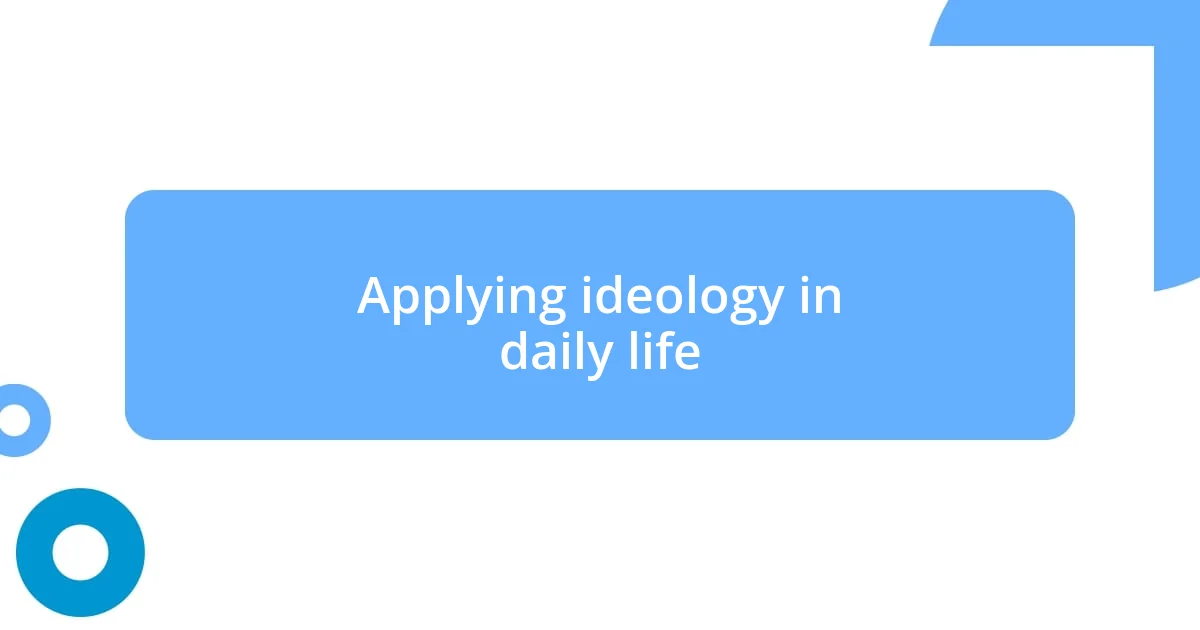
Applying ideology in daily life
Applying political ideology in our daily life can feel both empowering and challenging. I recall my first experience voting; the weight of my decision left me exhilarated yet anxious. I kept thinking, “What do my choices say about the values I hold dear?” This realization pushed me to educate myself further about candidates and policies since my votes reflect my beliefs.
Every day, I encounter moments where my ideological principles influence my interactions. I vividly remember a day when I had a heated discussion with a coworker over a project approach. As we debated, I realized that my commitment to equity made me advocate for inclusive practices in our team’s workflow. Have you ever felt your values guiding your decisions in unexpected ways? It’s fascinating how our beliefs can shape even seemingly small moments.
On a broader scale, applying ideology means making intentional choices that align with our values. For example, I started supporting local businesses as a means of promoting economic equity. I found myself asking questions like, “How does my consumption affect the community?” Such reflections grounded my everyday actions in a larger ideological framework, bridging personal choices with societal impact.


